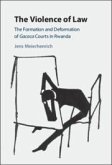In the classical law of nations there was a doctrine of civil war. This book sets out to recover the forgotten legal tradition that shaped the modern world from 1575-1975. The result is an autonomous reassessment of four hundred years of the law of insurgencies and revolutions, both in state practice and in legal scholarship. Its journey through centuries of rebellion and the rule of law touches some of the most basic questions of international law across ages. What does it mean to stand among the nations of the world? Who should be welcomed among the subjects of international law, who should not, and who should decide? Its findings not only help make the classical doctrine understandable again, but also offer potential new insights for present-day lawyers about the origins, aspirations and vulnerabilities of the legal tradition with which they work today.
Bitte wählen Sie Ihr Anliegen aus.
Rechnungen
Retourenschein anfordern
Bestellstatus
Storno








